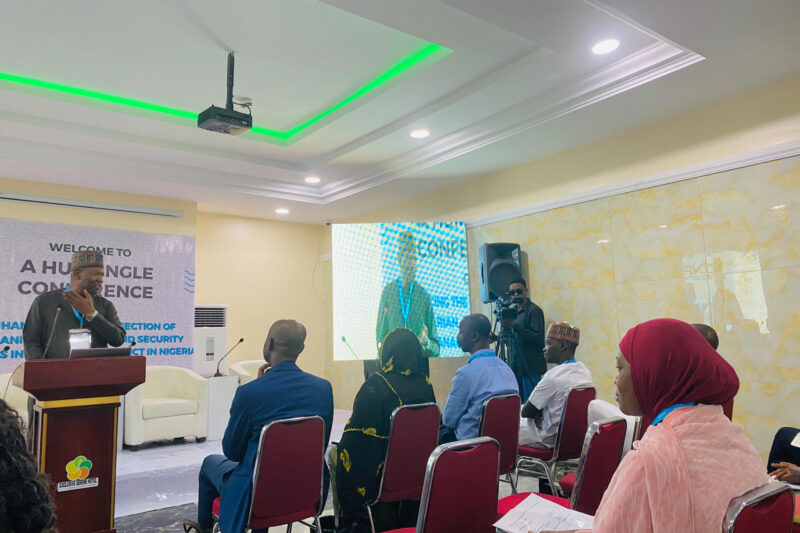Conference highlights the need for media, humanitarian and security sector to collaborate in conflict-resolution attempts.
The media, humanitarian organisations and security personnel need to work together to address Nigeria’s growing insecurity because each sector “is on the same side” and doing its best to improve living conditions in the country.
This was one of the main highlights at a conference held on Wednesday, November 22, at Abuja’s Exclusive Serene Hotel.
The one-day conference was organised by HumAngle Media and supported by the MacArthur Foundation . The aim was to “enhance the intersection of the humanitarian, media and security sectors in managing conflict in Nigeria”.
Radio Ndarason Internationale was among media experts, humanitarian organisations and security analysts who attended.
Hauwa Nuhu Shaffi, the managing editor of HumAngle media, said the organisation had always placed a strong emphasis on collaboration, emphasising the need for the media, humanitarian and security sectors to get together and have open discussions about Nigeria’s security situation to work out how they could improve it. This was particularly important in the Lake Chad Basin region.
She said it was crucial that a conference like this went beyond the regular reporting that was done and provided a tangible space where individuals from different sectors could gather, have these discussions and plan future directions.
“We are all on the same side,” she said, emphasising the need to collaborate.
In his keynote address, Professor Umar Pate, vice-chancellor of Federal University Kashere, emphasised that these three sectors – media, humanitarian organisations and security personnel – faced similar challenges and were already working together because, in the event of a conflict, the media disseminated information, humanitarian organisations intervened and security personnel ensured people’s safety.
He said when stories about conflict emerged, there was only one adjustment to be made – and that was for the security personnel and humanitarian organisations to give journalists the required information.
“Journalists must work with the civil society, civil society must work with the government, everyone must work together. We stand to benefit so much from this approach,” he said.
There were three panel sessions. The first discussed reducing mistrust between the three sectors. The panellists emphasised the need to establish a framework to tackle human-centred issues so that each could engage and respond quickly. They said there was a need for improved relations between the media and humanitarian organisations with security operatives and suggested a partnership, adding that it was crucial for the three sectors to integrate their technology.
The second panel session was a discussion on improving the administration of justice in conflict zones to curb sexual and other forms of gender-based violence and stop the perpetrators who committed these atrocious acts from getting away with impunity. Panellists made a point of emphasising how slow Nigeria’s judiciary system was in handling sexual gender-based violence (SGBV) cases.
They agreed that there was a need for education and awareness for victims, to teach them that their worth had not disappeared because of the sexual violence they had experienced.
Panellists emphasised the need for men to be included in discussions. They said many men were not aware of the different crimes that fell under SGBV.
They agreed that citizens and security personnel needed to develop knowledge, empathy and an understanding of how various people perceived justice. In many cases the perpetrator of the crime should be made to apologise to the numerous SBGV victims.
In the third panel session, youth-led non-governmental organisations (NGOS) shared their insightful thoughts on the importance of accountability in managing conflict.
Participants told RNI that they thought the three sectors needed to work together and to unite to complement one another’s job and make it easier.
The hosts were disappointed that many of the invited security personnel had not attended the conference.
RUKAIYA AHMED ALIBE






